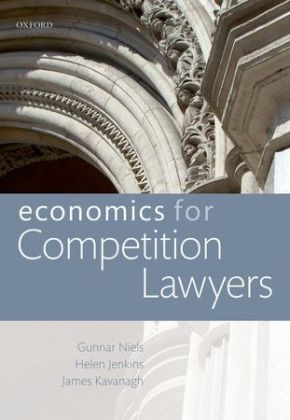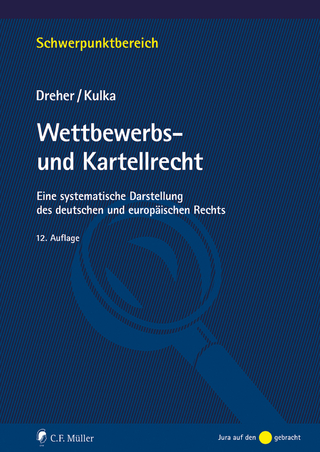
Economics for Competition Lawyers
Oxford University Press (Verlag)
978-0-19-958851-0 (ISBN)
- Titel ist leider vergriffen;
keine Neuauflage - Artikel merken
Why, in the context of a damages claim, are competitive industries more likely to pass on cost increases to consumers than less competitive industries? When can a merger or joint venture result in lower prices, even if there are no cost efficiencies? How can it be rational for a network provider to offer its services below cost in the early stages of network development, regardless of whether there are competing networks? Economics for Competition Lawyers answers all these questions and explains the underlying economic principles most relevant for competition law. An accessible practitioner textbook, written in the tone of an economic expert's report to a high court judge, the book is aimed specifically at competition lawyers, be they solicitors, barristers, in-house counsel, lawyers at government agencies, judges, or students. Practitioners of competition law worldwide need at least a basic grasp of economics, and some of the most successful competition lawyers are those with a solid foundation in economics.
This is not only because the most basic premise of competition law - "competition is good, monopoly is bad' - comes from economic theory, but also because economics provides many of the standard tools now commonly applied in competition investigations, such as the SSNIP test for market definition. Also, the substantive standards applied to mergers and business practices increasingly take account of economic effects on the market, and this requires reference to economic "theories of harm". This book therefore explains from first principles the economics that underpin market definition, market power/dominance, mergers, and anti-competitive practices, and shows how this knowledge can be applied in competition cases. For example, it goes beyond the standard explanation of the SSNIP test to cover issues such as when and how to define separate markets because of price discrimination. Likewise, on the matter of market shares, the book goes back to first principles to explain in which circumstances it is more appropriate to measure market shares by capacity than by turnover. It uses plain English and real-world examples, not abstruse theory, to explain the key points.
It also offers valuable insight into how to best use economics, or economic experts, in the course of a case.
The authors are economic experts at Oxera, with many years' experience in providing economic advice, teaching economics, working with leading competition lawyers, and explaining economic reasoning to a legal audience. They are listed in the International Who's Who of Competition Economists and the Guide to the World's Leading Competition and Antitrust Lawyers & Economists. The authors have published extensively in journals such as the Antitrust Bulletin, the European Journal of Law and Economics, the European Competition Law Review, and the Review of Network Economics. Dr Gunnar Niels has acted as expert across a range of jurisdictions, including the Netherlands, the UK, South Africa and Venezuela. Gunnar is a non-governmental adviser for the International Competition Network, and a member of the Expert Group of the Competition Law Forum. He is on the Advisory Board of the Competition Law Journal, and is nominated for 'Economist of the Year' in the Global Competition Review 2011 Awards. Helen Jenkins has appeared as an expert before courts and competition authorities across Europe, and in South Africa and Hong Kong. Helen is a Member of the Steering Committee of the Association of Competition Economics, and teaches the Diploma in Economics for Competition Law at King's College London. James Kavanagh has worked on competition, state aid and damages cases before authorities and courts in the UK and elsewhere in Europe. James runs the training course Using Economics in Competition Law, and contributes to the Diploma in Economics for Competition Law and the Training Programme for National Judges in EC Competition Law.
1. Introduction ; 2. Market definition ; 3. Market power ; 4. Abuse of dominance ; 5. Cartels and other horizontal agreements ; 6. Vertical restraints ; 7. Mergers ; 8. State aid ; 9. Design of remedies ; 10. Quantification of damages ; 11. The use of economic evidence in competition cases
| Erscheint lt. Verlag | 1.5.2011 |
|---|---|
| Co-Autor | Helen Jenkins, James Kavanagh |
| Zusatzinfo | Illustrations, maps |
| Verlagsort | Oxford |
| Sprache | englisch |
| Themenwelt | Recht / Steuern ► EU / Internationales Recht |
| Recht / Steuern ► Wirtschaftsrecht ► Wettbewerbsrecht | |
| Wirtschaft ► Volkswirtschaftslehre | |
| Schlagworte | Rechtsanwalt • Wettbewerbsrecht • Wirtschaft |
| ISBN-10 | 0-19-958851-1 / 0199588511 |
| ISBN-13 | 978-0-19-958851-0 / 9780199588510 |
| Zustand | Neuware |
| Haben Sie eine Frage zum Produkt? |
aus dem Bereich


